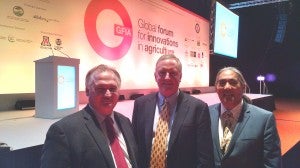
Fred Yoder, Ernie Shea and A.G. Kawamura representing the North American Climate Smart Agriculture Alliance at the Global Forum for Innovations in Agriculture in Abu Dhabi.
Climate smart agriculture is still a new concept – but it won’t be for long. In the past year alone, there have been several key developments that are bringing sustainable farming to scale:
- The Global Alliance for Climate Smart Agriculture was launched to bring together government, academics, non-profit organizations and the private sectors to support farmers across the world in responding proactively to changing weather conditions associated with climate change.
- A diverse group of 34 organizations and universities launched the regional North American Climate Smart Agriculture Alliance, which will interface and collaborate with the Global Alliance.
- Earlier this month at the Global Forum for Innovations in Agriculture in Abu Dhabi, over 3,200 attendees from across the globe – including the Global and North American Alliances – gathered to share their plans for implementing climate change mitigation and conservation practices.
I asked Fred Yoder, chair of the North American Alliance and past president of the National Corn Growers Association, about what happened in Abu Dhabi and why the North American plan may be a template for the rest of the globe.
Why was the North American Alliance in Abu Dhabi?
We were there to present our work plan to the attendees from over 100 countries – we’re still in the early stages, but we have clear objectives that we shared with participants:
- Educate agricultural and forestry leaders on the potential impacts of climate change;
- Equip producers with the tools and knowledge they need to make informed decisions and manage new risks;
- Mobilize thought leaders to advocate for needed changes in land use practices, research, education and policy; and
- Inspire agricultural and forest sector leaders to spark discussions of climate change, including adaptation and mitigation.
What are other countries doing to embrace climate smart agriculture?
Regions across the globe are also creating alliances – African, Asian, Central American and European Alliance are forming or are already formed to meet the changing needs of agriculture because there is no ‘one size fits all’ model given differences in geography, natural resources, and culture. Plus, some areas are water-rich and others are suffering extreme drought.
But we’re all working towards three common outcomes: sustaining farmers’ livelihoods and increasing their productivity, increasing the resiliency of food systems, and reducing greenhouse gas emissions from agriculture.
The North America Alliance is far along in the planning process since we worked with farmers and their NGO, academic, government and supply chain partners to identify risks that changing climatic conditions pose to production agriculture, and steps that need to be taken to adapt. This gives us a chance to provide leadership and a template for implementing sustainable agricultural practices.
We all need to keep in mind that economics will be the biggest driver for growers – when farmers find practices that work and make economic sense, they’ll share that information with fellow farmers. So we need options that will increase yields or reduce input costs – or we won’t be successful. Farmers are already facing slim profit margins – but profits allow farmers to invest in sustainability measures like precision agriculture technologies that can help optimize fertilizer use.
What happens next to keep the momentum going?
We need to bring more members into the North American Alliance – our goal is to have 100 organizations on board by the end of 2015. At the same time, we need to equip farmer leaders to educate and train fellow producers across the continent in climate-smart agricultural practices.
And we need to keep talking – and blogging, educating growers, sharing knowledge, and partnering across all sectors. At the end of 2015, we’re convening a national climate smart agricultural summit to share and discuss new technologies, research, and tools that can help producers improve resiliency, adapt and mitigate the current and future risks of changing climatic conditions.
To learn more about the North American Climate Smart Agriculture Alliance visit Solutions from the Land, the project sponsor, at www.SfLdialogue.net.









